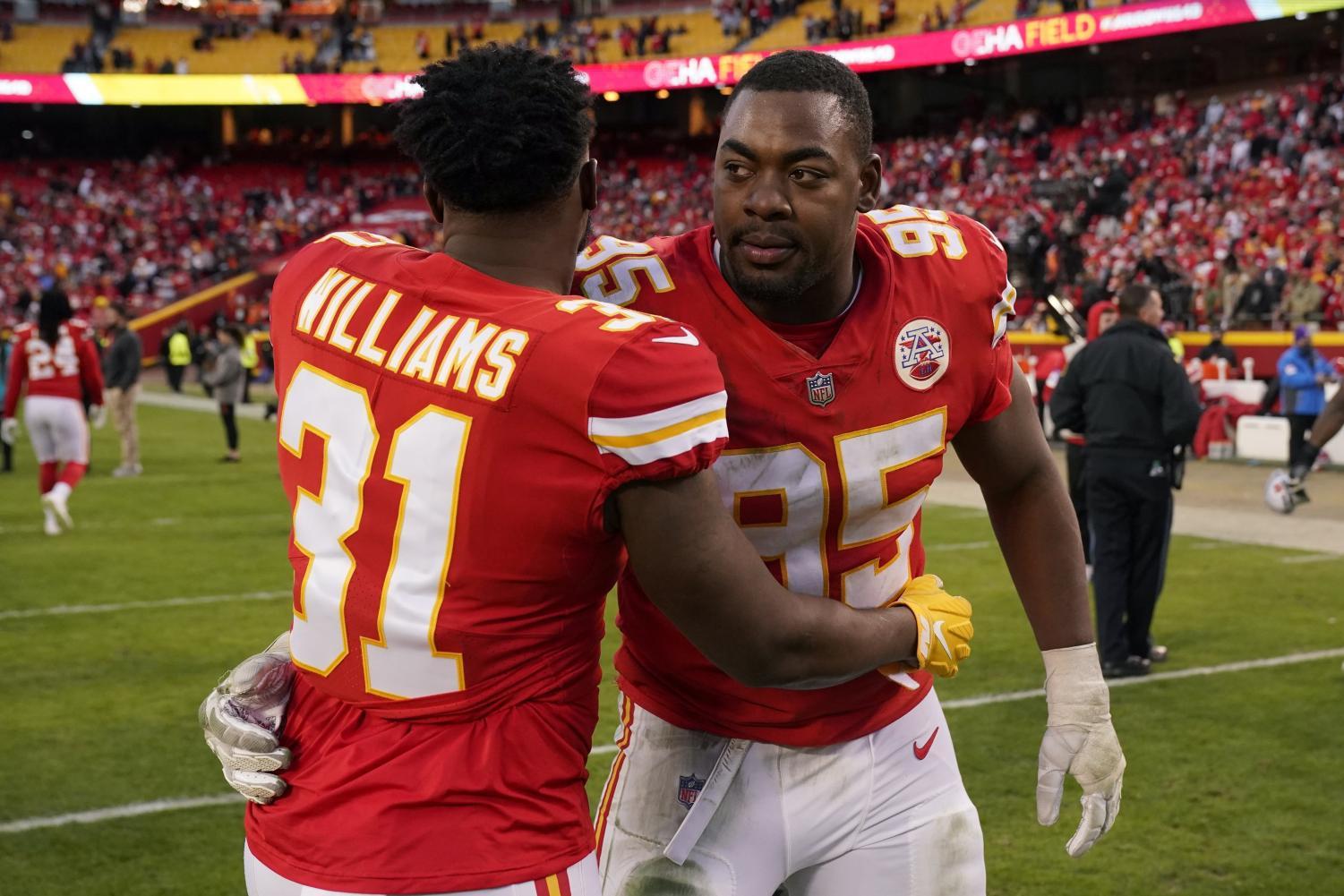Point-Counterpoint | Coin flips shouldn’t decide high-stakes NFL playoff games


Kansas City Chiefs running back Darrel Williams (31) walks off the field with teammate Chris Jones (95) at the end of the AFC championship NFL football game against the Cincinnati Bengals, Sunday, Jan. 30, 2022, in Kansas City, Missouri. The Bengals won 27-24 in overtime.
This column is part of a point-counterpoint series. To read the opposing side, click here.
When the Chiefs won the coin toss to decide possession in overtime against the Bengals in Sunday’s AFC Championship Game, most people thought the game was over. The home crowd erupted as Kansas City elected to take the ball first and commentator Tony Romo made a telling observation about what the world was expecting to happen.
“Why does everyone just assume that Mahomes has already scored here, wow,” Romo said with a laugh.
It was true though, apart from the immediate crowd outburst, social media reacted in a similar fashion, assuming the game was all but over due to the structure of the NFL’s overtime rules.
Like the beginning of the game, overtime possession is initially decided by a coin flip. The rules state that each team will have an opportunity to possess the ball and score, unless there is a touchdown scored on the first drive. The contingency of the game ending with a first drive touchdown is the one that draws controversy. Due to this stipulation, it is unheard of for a team to defer possession at the beginning of the overtime period.
In the regular season, teams that win the coin toss come out on top 52.8% of the time, which is a fair outcome percentage. It’s in the postseason where the advantage becomes clear, with the team that wins the coin toss sealing the victory ten of the last 12 times playoff games go to overtime — a much more skewed margin.
Perhaps the most controversial instance of the first possession rule impacting the outcome of a game that occurred just last weekend when the Chiefs outlasted the Bills 42-36 in overtime.
In that game, the Chiefs won the overtime coin toss and promptly marched down the field to score a touchdown, leaving fans to wonder what would have happened if the script was flipped. Would the Bills have done the same thing if they won the coin toss? In such a high-stakes, offensive minded contest, fans felt let down that they didn’t get to see the Bills even have a chance to win the game.
It felt as though the game’s result was left to chance — decided on the outcome of a coin flip.
The overwhelming argument in favor of keeping the overtime rules is that defense is part of the game, so it’s only natural that the team that loses the coin flip needs to make a defensive stop.
It’s a fair argument, but why does only one team need to be in a position to make the stop? Both teams should be put in a position where they need to show up on both sides of the ball, just as they had been the entire game.
For the sake of argument, imagine the first-possession touchdown stipulation is removed from the overtime rules. Now, once again, teams would need a strategy going into the coin flip. Teams could defer the kick and rely on their defense to make a stop, setting up a game winning drive once their offense takes the field. Or they could elect to receive and try to score on the first drive to put pressure on the opposing offense.
The first drive stipulation puts far too much emphasis on winning the coin flip. Get rid of the rule, and overtime will not only become more exciting, but more equitable in the process.
It’s a shame fans didn’t get to see Bills quarterback Josh Allen and Chiefs quarterback Patrick Mahomes II each get a chance to lead their offense in overtime. Maybe they’ll get to see it with a much needed rule change next season.
Recent Posts
Porch roof collapse injures dozens during party on Semple Street
The roof of a porch on Semple Street collapsed during a St. Patrick’s Day celebration…
A Good Hill to Die On // Break It Down
In this release of “A Good Hill to Die On,” I dive deep into the…
Who Asked? // Does growth only “count” if it’s quantifiable?
This installment of Who Asked? by staff writer Brynn Murawski wonders why it feels like…
“They’re throwing trans people under the bus”: Counseling center faces backlash after event name change
On Feb. 24, Pitt’s Counseling Center faced backlash after briefly renaming an event from "LGBT…
Q&A: Meet the 2024-2025 SGB president and vice president
SGB announced the 2024-2025 election results at their meeting on Tuesday. The Pitt News spoke…
Editorial | Pitt Administration must listen to its students’ electoral demands
The passing of these referendums does not guarantee a future Pitt with these policies. Merely,…

